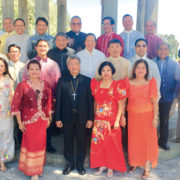“I FIND fulfillment as a priest when I serve and minister to the people, the faithful, whose marriages and status in life before the Church need help. I believe in this ministry of justice, truth, healing and reconciliation, for even though truth might be difficult, it is what it is, that some folks are not meant to be married. Through the annulment process in the Church, we find what really happened, it is not to pinpoint the blame, but when the whole truth is known by the parties, while painful, truth can become a source of joy [later on]. The annulment, a closure to painful chapters of lives, can be the beginning of healing, and folks can move on.” – Fr. Reynaldo Matunog, 2011
His last name means resonant and vibrant. And such was the early life of Fr. Reynaldo Matunog who comes from a family of eight siblings, along with devout churchgoer Suprema S. Bonite, his mom and his father, Melecio G. Matunog, Sr.
Fr. Matunog got his moral calling while in high school, when he heard bout the priestly vocation from a priest. This encouraged him to join a minor seminary, Pope Paul IV/St Joseph College in Maasin, Southern Leyte . He completed three years of philosophy at Sacred Heart Seminary in Palo, Leyte and finished his Bachelors in Theology at the University of Santo Tomas (UST). He was then ordained by Bishop Vicente Ataviado to priesthood on April 11, 1991.
In his first assignment as associate pastor of Maasin Cathedral, Fr. Matunog was in charge of the catechists in their formation and ongoing formation seminars. For four years, he was also the catechetical director in the larger diocese of Maasin. When he was assigned pastor of Assumption in the Hills Parish, he oversaw the building of a new rectory and a new church, which seats 750 parishioners, costing Php 8,000,000. While serving as pioneer priest for this parish, he was in charge of formation of the parishioners and awareness of their parish’s identity as separate from the cathedral.
Fr. Matunog travelled by foot, motorbike or jeepney to reach distant chapels within the parish. He travelled as if on a boat when he would walk or ride unpaved, muddy, pockmarked dirt roads. This summoned not only his patience, but also a willingness to undertake personal sacrifices to provide pastoral services.
Later, he became the pastor of Holy Spirit Parish in Visca, Baybay Leyte. Here, the focus of his ministry was the academe, the agricultural farmers, fishermen, students, university workers, and the member chapels located in the neighboring barangays.
In his 10th year of priesthood, he requested permission to pursue further studies. He completed a Licentiate in Canon Law in Universidad de Navarra in Spain and completed all the academic requirements, but for his dissertation, towards a doctorate in the same university.
While in Spain , he got exposed to the practice of faith by the Spaniards. This is where he gained appreciation for the deep faith and the Catholic heritage of Filipinos. Like the United States, he sensed a declining attendance for Sunday masses in Spain, yet most Catholics participated actively in processions, fiestas, and traditional celebrations during Holy Week and Devotion to Saints. While he recognizes the difficulty of generalizing and while he believes faith is personal and internal, he witnessed that most of the locals’ attendance were during cultural festivals.
Fr. Matunog, in the interview, shared his knowledge on the process of annulment for the benefit of Asian Journal readers. “Canon law referes to the laws of the church, but founded on Theology. It is basically Theology being applied to the practical and juridical life of the Church. It is theology in the laws of the Church,” he said.
He explained that annulment in the Philippines is two fold: one done by the state and another done by the Church. In the United States, he described annulment as a ministry to couples whose marriages have ended in separation and divorce. He said an investigation takes place before it is decided on. The process, at the shortest, can take six months. It takes longer for complicated cases.
Annulment can be heard or based on several grounds that are supported by evidence and proof within the common life: problems existed at the moment of exchange of marital vows: incapacity, impediments caused by previous bonds to another creating a defect from the start, and incapacity to give consent traceable to intellectual, psychological and emotional factors and lack of canonical form. He handles more than 300 annulment cases per year.
Fr. Matunog said he finds fulfillment in his current assignment. He said after the tribunal completes the investigation and proof is found that grounds of annulment are present, the parties reach a point of truth and reconciled to that truth. Their marriage, once an integral part of their life, is now succeeded by annulment which becomes a spiritual aspect of their healing. At this state both are reconciled to God, their Church, and to all others.
When asked about the Taoist tale on the bell stand, he shared, “The Woodcarver was able to make the bell stand only because of his total being’s oneness with God. The Gospel is so clear; our Lord Jesus said: “If you want to follow me, take up the cross and follow me.”
“By Divine Providence, although I did not see it before, I found my studies in Spain providential, as I got to know Spanish, I am able to serve a Latino parish,” he said.
“Being a Filipino, I can help minister and I handle cases involving Filipino couples and parties to annulment. I just celebrated 20 years of priesthood while I get to serve people from my line of expertise as a canon lawyer,” he said, adding, “Priesthood is a very fulfilling ministry. To the young, single people out there, consider being a priest as a vocation in life to pursue.”



